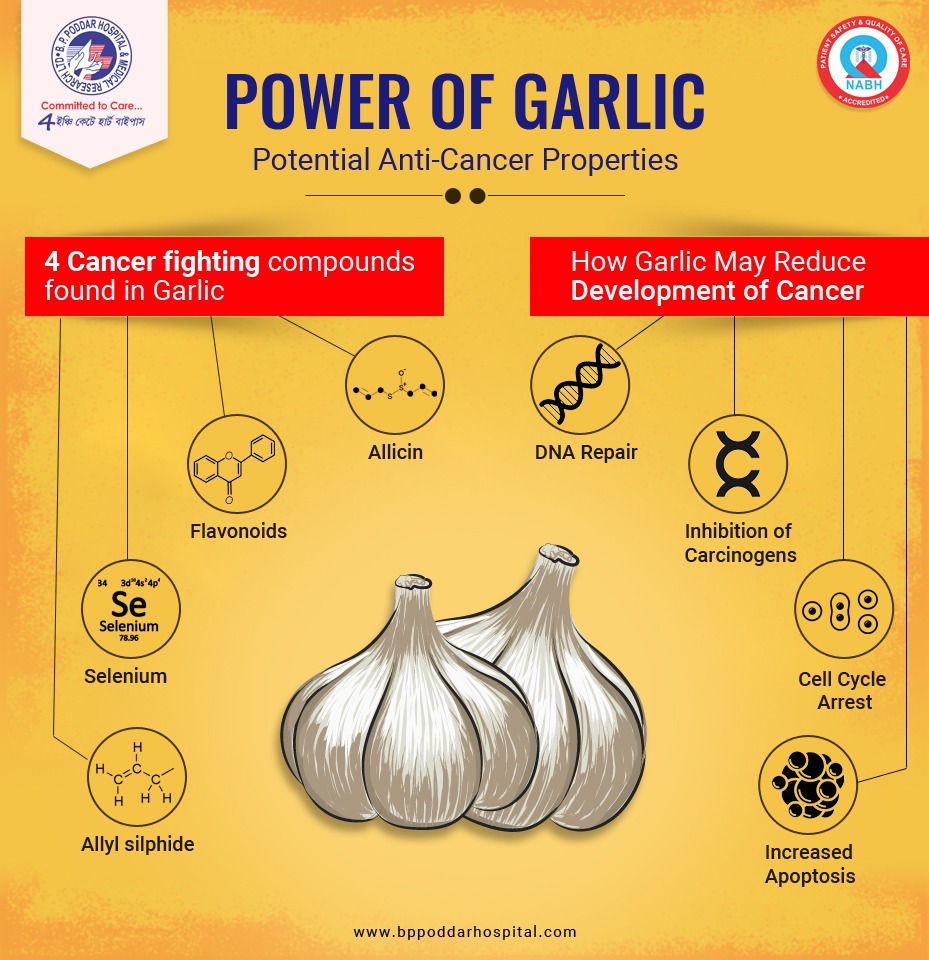
Garlic is a vegetable in the  Allium  family of bulb-shaped plants. It grows in several sizes and colors and it can be planted alongside other vegetables as a natural pesticide.
You'll know where the garlic is planted long before you see it, as its strong, sulfuric fragrance will declare its location very distinctly. Although dining on garlic-flavored foods may give you "garlic breath," doing so can improve your health by lowering high blood pressure and bad cholesterol.
When looking at potential benefits of foods in relation to cancer prevention, it's helpful to look both at population studies (do people who eat a large amount of the food have a lower rate of cancer?) and the possible mechanism by which they work (does the biological mechanism fit?)
It's certainly not possible to prevent all cancers, but population studies have found a reduced risk of the following cancers in people who consume more garlic:
Garlic has natural antioxidants and is anti-inflammatory, antibacterial, and antiviral. The knobs and cloves of garlic contain high levels of sulfur, flavonoids, and selenium. And, when it is crushed, chopped, or bruised, garlic produces the compound allicin.
It is garlic's antibacterial properties that may help to prevent cancer as well as its ability to enhance genetic repair, slow down cell proliferation, and prevent the formation of carcinogenic substances  in the body.
Four of the cancer-fighting compounds in garlic include:
There are several mechanisms by which garlic may inhibit the development of cancer. There are additional mechanisms by which it may also slow the cell cycle in cancer cells already present or induce apoptosis (cell death). Examples of just a few of these are discussed here.
Garlic's ability to enhance genetic repair, in particular, is worth noting. Cancer begins when a series of mutations (damage to DNA in cells) leads to a cell grows out of control (a  cancer cell) and becomes a cancerous tumor.
Damage to DNA in genes in the human body is common, caused by both environmental carcinogens and the products of normal metabolism in the body. Even when substantial damage occurs, however, the body has a way to either repair the damaged DNA or eliminate un-fixable damaged cells. Tumor Suppressor Genes are genes we all have that carry the blueprint for proteins that do these jobs. When these genes are mutated, a person may have an increased risk of developing cancer (a genetic susceptibility). BRCA Gene mutation  are an example of mutated tumor suppressor genes.
Cancer is common, affecting one in two men and one in three woman during a lifetime (not including skin cancer). While we are familiar with some of the causes and can thus avoid them, there is much that we don't understand. Therefore, a dietary compound that enhances DNA repair when damage occurs is exciting.
A 2019 study further supported the role of garlic in DNA repair in that (at least in the lab) garlic appeared to enhance the expression of tumor suppressor genes.
Just as dietary components may lower cancer risk, there are some that increase risk as well. Both nitrosamines and heterocyclic amines fall into this category. Heterocyclic amines are one of the reasons that grilled meat is associated with an increased risk of developing cancer. The grilling process itself, and exposure to heat alone can result in these carcinogens being formed. (Grilling vegetables does not result in heterocyclic amines). Garlic appears to inhibit the formation of both heterocyclic amines and nitrosamines in grilled food.
Adding a little garlic to your meats before grilling might help, but there are other ways to reduce carcinogens in food, such as marinating meats for 20 minutes before cooking, cooking at lower temperatures, and using the right charcoal.
There is currently research looking at the potential role of garlic in cancer treatment. While the research is still in its infancy, and we don't know whether studies done in the lab can translate into actions in the human body, it doesn't necessarily matter if you are using garlic to enhance the taste of the foods you eat. According to a 2019 study, garlic may affect signaling pathways in cancer growth in a number of ways.
Few studies have been performed looking at the potential role of garlic treatment in humans, though a 2019 study was encouraging. Gastric cancer is very common worldwide, being the leading cancer diagnosis in some countries. A 2019 study in China found that both H. pylori treatment (the bacterial infections associated with stomach cancer) for two weeks or garlic supplementation for seven years were associated with a significantly reduced risk of death due to gastric cancer.
Cancer cachexia, a syndrome that includes both unintentional weight loss and muscle loss (atrophy), is thought to be directly responsible for roughly 20% of cancer-related deaths. To date, the prevention and treatment of cachexia has been challenging, and supplementation of calories alone is inadequate.
A component of crushed garlic, A-ajoene, has intrigued researchers as a potential therapy in reducing cancer cachexia. A 2019 study looked at the effects of an ajoene extract both in mice and in human cancer cells grown in the lab. It was found that ajoene may function in two separate ways both to reduce the inflammatory responses that contribute to muscle atrophy and by actually promoting muscle protein synthesis. It's not yet known if these results will mean that ajoene (a sulfur compound present in crushed garlic) can protect against muscle atrophy in people with cancer, but garlic may help in yet another way. A lack of appetite is far too common with cancer, especially advanced cancer, and garlic can spice up a meal to make it more appetizing.